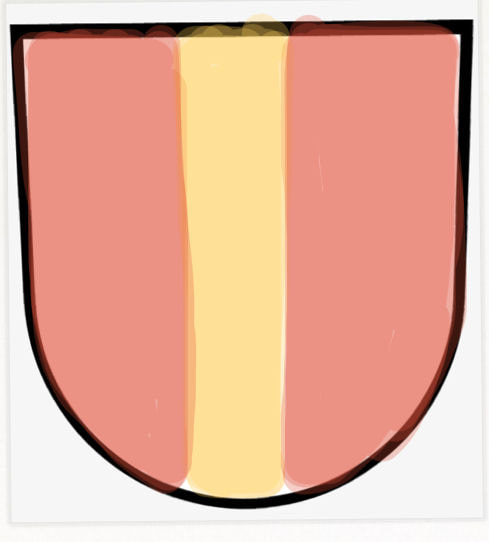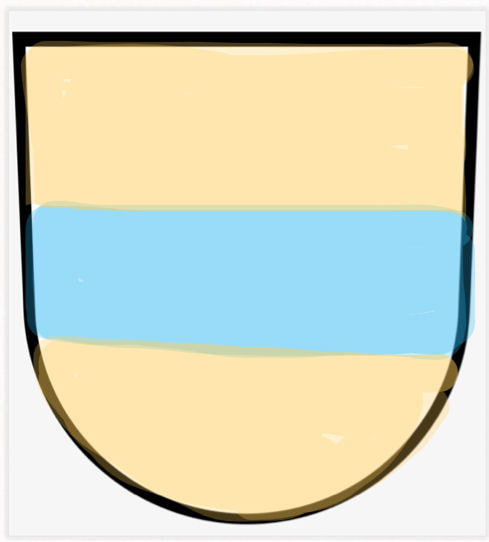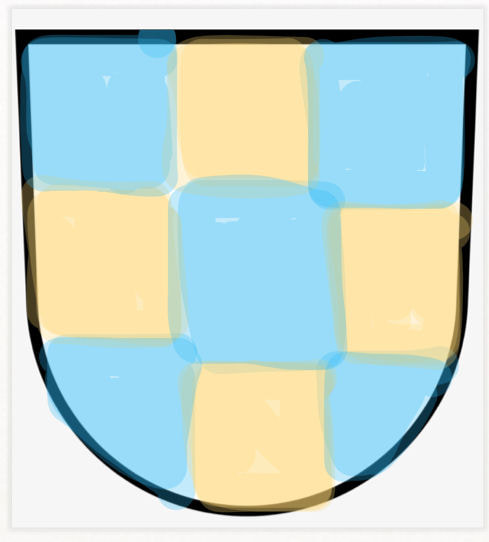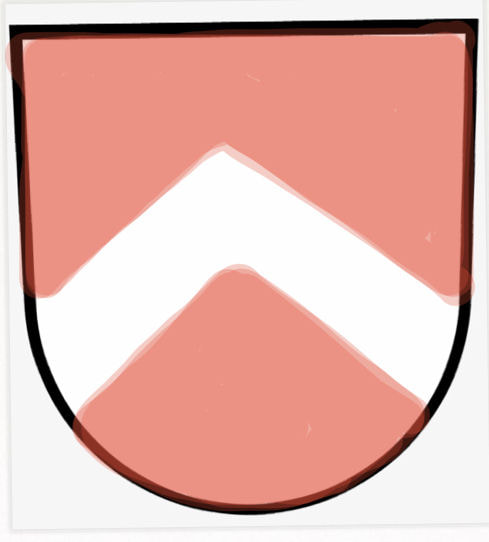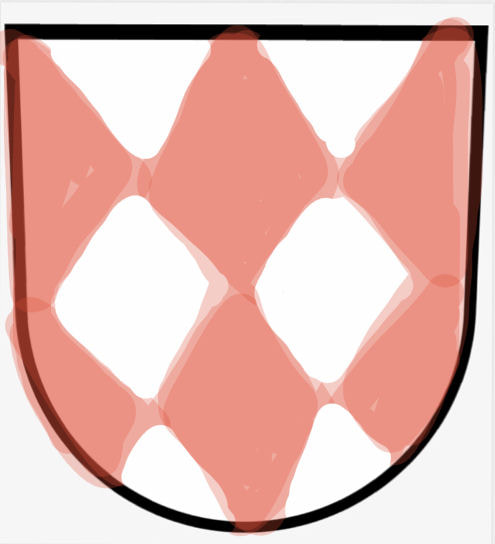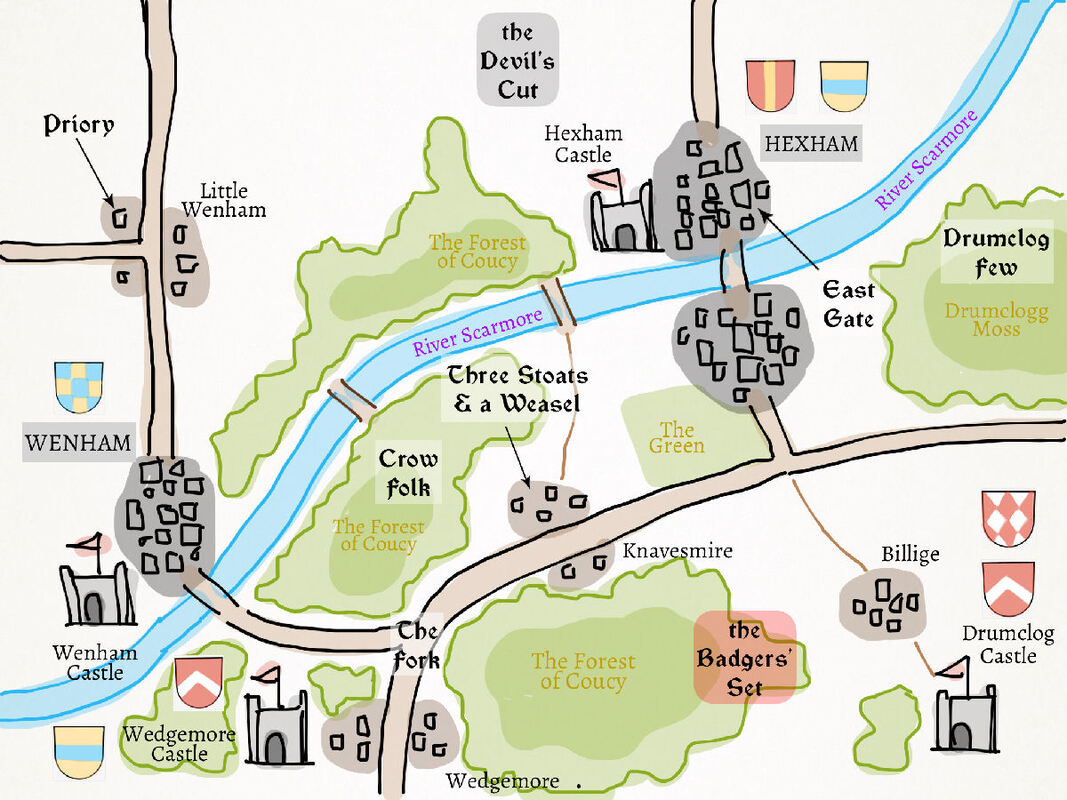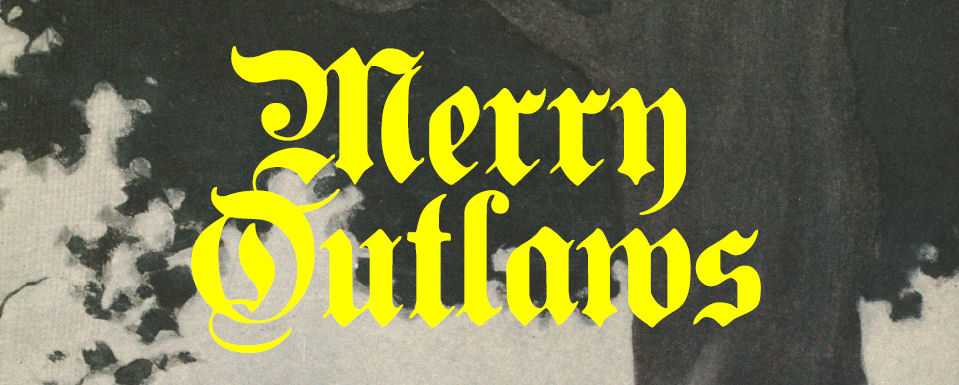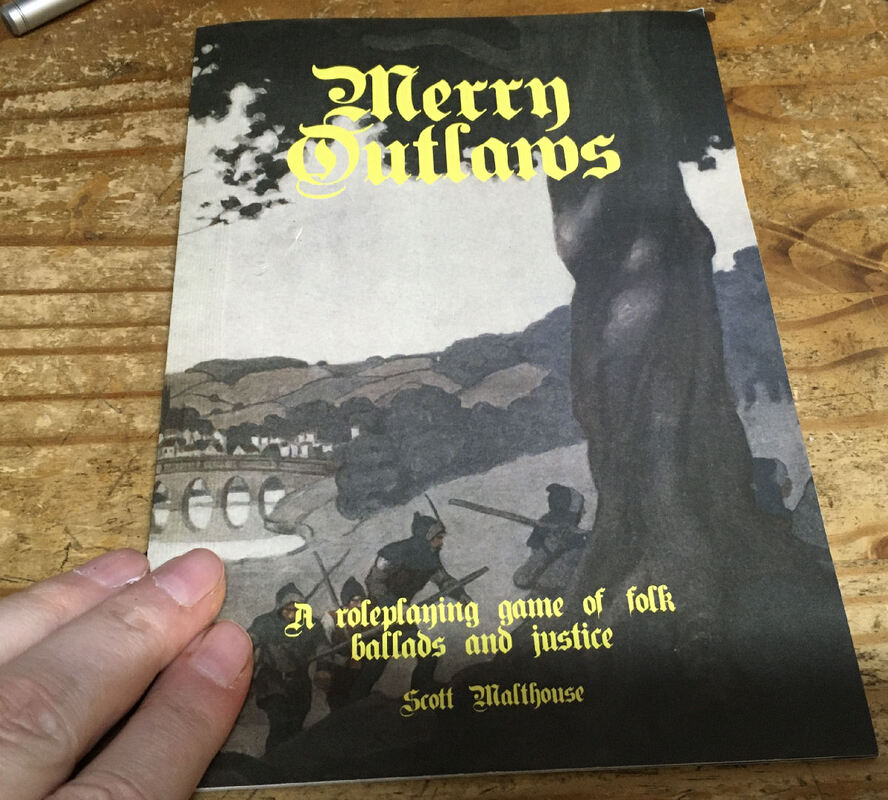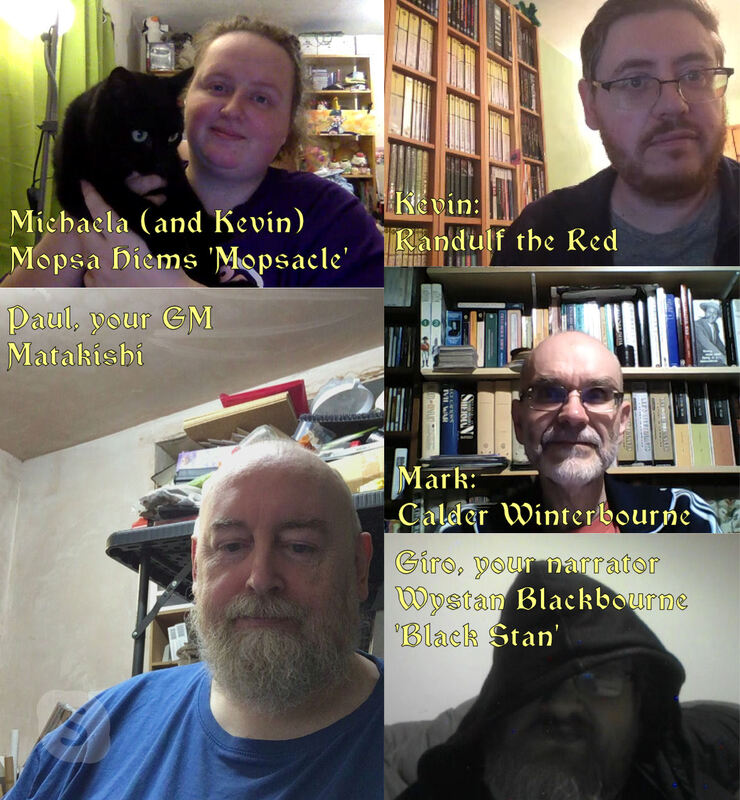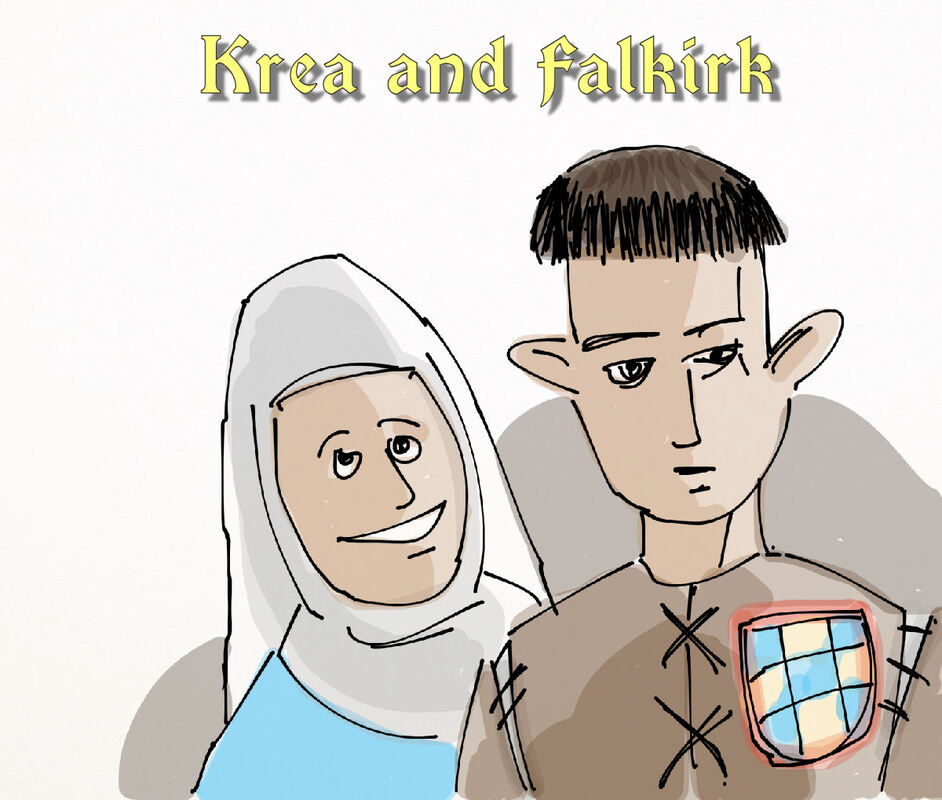|
The Merry Badgers of Billige
Our merry band consists of: Calder Winterbourne a.k.a Mouse Eater - played by Mark. Swift footed and skilled with the bow. Mopsa Hiems a.k.a Mopsacle - played by Michaela. Silver tongued and sharp-eyed. Randulf the Red - played by Kevin. Handy with both fist and mace. Wystan Blackbourne a.k.a. Black Stan - played by Giro. Wilderness traveller, well-informed and keeper of this chronicle. The county of Hexhamshire
The Poisonous Prioress
The King is weak, his subjects suffer Rebellion ferments with England the prize Troops from France arrive on our shores All will burn when the barons rise Money destined for rebel coffers Seized by force on a forest road Given to those that really need it By heroes with an honourable code Billige is quiet, too quiet.
Location: The Forest of Coucy. Some time had passed since we gave half of Sidon Lister's money to the needy and it had been a quiet time. Too quiet for our liking, we discussed matters and decided we would head out to Billige. We had friends and allies there who might be able to give us news or pass on rumours. Billige was bustling, there were twice as many people in the village than usual. The flow of carts to Drumclog Castle had dwindled somewhat and now they mostly carried food and supplies for the workers and builders. The village folk grumbled and complained, the increase in traffic had driven up the prices of everything. Randulf sought out the foresters he had befriended a few weeks ago and asked them what their thoughts on the situation were. Initially, the foresters were unhappy; the intrusion of Sir Clugney's own foresters had made their activities all the more difficult. However demand for meat and food in general had increased, they had cut a deal with the village pie-maker to supply him with meat for his pies. The pies sold well and they all made a tidy profit from it. Meanwhile, Calder had gone to speak with Alice the herbalist. Ever astute; she wondered where all the money was coming from for all this construction. The materials and the labour? Alice said that she had been to Wedgemore and the town didn't look particularly well off. Sir Clugney just didn't appear to have the wealth to make it all possible. This information was intriguing, but not very helpful. The squire
Next, we decided to pay Emlyn a visit and see how his recovery was progressing. Eschewing the forest route, we took the road to Knavesmire, the journey was unevenful. Soon enough we were back in the village, bleak and dismal as we remembered. There was something new here though - a maypole! Osric has been busy. The only ray of light in Knavesmire was the inn, we hurried towards it. The road than ran through Knavesmire was often travelled by people and many of them frequented the Three Stoats and a Weasel. Consequently it was always busy, today was no different. It was chatty, noisy and crowded, looking around, nobody out of the ordinary was here, save for one man. Sitting at a table was a young man, we did not recognise him but he bore Sir Conrad's livery, one of his squires. Our curiosity was piqued, we decided to approach him. Mopsa offered him a drink and some conversation, he seemed suitably amenable. He was plied with more beer and pies, as always the food here was surprisingly palatable. Once he was sufficiently inebriated, we discovered his name was 'Falkirk'. Leaning in towards us and talking in what he considered hushed tones, he shared some information with us. He said he was on a 'secret mission' for Sir Conrad. We asked him the nature of this secret mission. Falkirk confided that Lady Margaret was now pregnant and was suffering morning sickness, Falkirk went on to say that Sir Conrad had tasked him with delivering 'medicine' to her. This was definitely an interesting turn of events! We asked Falkirk to Elaborate. He told us that he had been instructed to go to the priory at Little Wenham, collect the medicine from Mother Benevolence and the Sisters of Contentedness, then take it to his sister Krea. She was a lady-in-waiting for Lady Margaret. Krea would then 'surreptitiously' give the medicine to Lady Margaret in one of her drinks. Mother Benevolence was a person I recognised. She was not known much as a healer, however she did reputedly supply lethal poisons to be applied to the nearly dead to 'help them on their way'! It was fair to say that our suspicions were raised. Next we asked Falkirk why this was done secretly? Falkirk paused for a moment, clearly considering his words. He said that Lady Margaret was a little 'strange' and believed in the 'old ways'. Sir Conrad had insisted that it would be unlikely that she would want to take this medicine willingly, so it had to be given secretly. Falkirk said she was too young and beautiful to be a witch obviously. He added that he didn't believe that Sir Roland knew any of this. We then asked why would Sir Conrad become involved in this. Falkirk replied, "Sir Conrad is doing his Christian Duty," Finally Falkirk explained to us that he had first taken medicine to Lady Margaret a week ago, this was to be his second delivery. By now Falkirk was well and truly drunk, loudly cheering Roland and Conrad to the other patrons whilst cursing Clugney. He seemed to be attracting quite a few sideways glances! Eventually he slumped face first on to the table with a thump, a few seconds later he began loudly snoring. Putting his feet up, we moved him into a better sleeping position and while doing this, we slyly searched him, making sure no one else here noticed our actions. We found a phial, it contained a curious looking liquid. We obviously needed someone with the appropriate knowledge to examine it. The choice was obvious; Alice the herbalist. We made a request of Leopold, the inn's proprietor and he provided us with a watertight container, into which we poured this liquid. The phial was re-filled with ordinary water and slipped back into snoring Falkirk's possession. Ambush!
It was time to head back to Billige. Upon leaving the inn, we heard a momentary whistling sound. Faster than we could think, a volley of arrows struck us! We were ambushed! Peppered with arrows, we dived into cover, these were black feathered shafts. Crow Folk! How had they known we were here? Cautiously, we peered out of cover and there they were: Across the road from the inn, skulking in the shadowy places between the small houses. and hiding behind corners were eight Crow Folk. We returned fire from cover. Except Randulf; who of course chose to run yelling across the street at them, pumping his fists and waving his mace as he did so. I think he considered it a greeting of sorts? He laid into them fiercely and Calder landed arrows with uncanny accuracy. Mopsa and I managed to also lay into them with our bows. We had sustained some injuries ourselves, but in the end the Crow Folk had been dealt with, save one who Randulf chased, tackled to the ground and took prisoner. Searching their bodies, we found nothing of note on them but for some coins. Once we were done with them, we left them to the villagers who came and stripped them of all remaining possessions. The bodies were taken away, no doubt to feed the pigs! There was a prisoner to question now. He told us little, he did admit that there were spies in Knavesmire - not a surprise to us, but he did not know who they were. He had been dispatched here directly from the camp in the forest. We let him go with a good kick up the arse! As he fled into the forest, I shouted. "Tell the brothers that we're coming for them. And we're going to send them to hell!" The priory at Little Wenham
Now that it seemed safe, we set out for Billige and arrived without mishap. After finding Alice, we handed the liquid over to her and she agreed to examine it. It did not take long, but we took the opportunity to recuperate a little. Alice came back and informed us that the liquid was a 'hemlock preparation' - poison. Someone was trying to poison Lady Margaret. Could it be Falkirk? He had the opportunity to switch the medicine for poison. He was also quite open about his role in this. The poisoner would not be so forthcoming. He seemed an unwitting accomplice. In our minds there were two suspects. Was it Sir Conrad? Had he asked Mother Benevolence to provide a poison to administer to Lady Margaret? Or was it Mother Benevolence? Had Sir Conrad asked her to provide medicine and she instead switched it for poison? Conjecture was pointless, we needed to investigate. The priory at Little Wenham would be our first call. Before heading out, we took a diversion to our camp and collected the monk and nun outfits. We set out for Little Wenham and decided to avoid the roads. We had little desire to be ambushed twice in one day. After leaving the southern half of The Forest of Coucy, we followed the track and forded the River Scarmore, once again passing Watt's burnt out cart. From here we walked into the northern part of the forest, fairly certain that we would not be hindered by The Crow Folk were concentrated on the other side of the river. Our plan was to head westward and cross through the forest to arrive at Little Wenham. Despite my knowledge of the forest, we lost our way! It turned out that there were few to no paths or trails that travelled the deepest, quietest and shady parts of the forest. There was however, an abundance of greenery and shrubs to hinder our passage, branches and bushes to snag our clothes and roots to trip our feet. With no path to follow we stumbled and blundered clear of the forest. After we took stock of our bearings, we realised that we were north of the forest instead of west. We marched cross country towards the afternoon sun until the shadows lengthened, the day cooled and darkness was beginning to creep up behind us; it was nearly dark when we reached the road and Little Wenham. It appeared to be a well-to-do and respectable town, houses were clustered round the church, a gibbet sat in the town square and there was of course, a priory. It was very unlikely that we were known here, we could safely pass through. Before approaching the priory, Calder, Mopsa and Randulf assumed their disguises. We decided to present ourselves as travellers in need of a place for the night. The priory was a sturdy stone building with an equally sturdy heavy wooden door. A minute after knocking, an eye appeared at the small viewing panel, taking the measure of us. A woman's voice asked us our business. We explained that we were travellers in need of shelter for the night. The eye turned to face me and asked who I was. I explained that I was their guide. There was truth to that. Our answers seemed satisfactory, the eye disappeared and the door opened. A nun was there and we were granted entry. With a lowered voice she explained that we would be given an evening meal and taken to our rooms for the night. Inside the priory there was an air of quiet calmness, our footsteps sounded uncomfortably loud as we walked down the sparsely decorated stone corridors. Before were taken to our meals and as politely as possible we requested a meeting with Mother Benevolence. The nun turned to us and revealed that she was who we were looking for. We asked Mother Benevolence if she had supplied medicine for Lady Margaret. She was quite taken aback and surprised, she did not know what we were talking about. Perhaps this required a slightly different approach? So we asked her if she had given any medicine to Sir Conrad's squire, Falkirk? She had not, but she had given him poison! This was surprising We asked Mother Benevolence to tell us more. She told us that the poison was for some of Sir Conrad's hunting dogs that needed to be 'put down'. Mother Benevolence went on to explain that this request had come directly from Sir Conrad when they both attended the Feast of Saint Beatrice last week. We thanked Mother Benevolence and retired to our rooms. It seemed that we possibly had an answer. Sir Conrad was using Mother Benevolence to produce poison, using Falkirk to deliver it in the guise of medicine and using his sister to unwittingly administer it secretly. It was an impressively elaborate plan, but what did he gain from the death of Lady Margaret? We could not consider moving against Sir Conrad, not at least directly. He was too powerful and too influential. Instead we decided to seek out Lady Margaret and warn her. Morning came and streaks of dawn sunlight blazed through the windows, we woke to our cool stone rooms lit by a hues of gold. We rose and dressed; simple as it was, it had been sometime since we had slept in accommodation such as this. Morning in the priory was as equally subdued as evening, the sisters went about their chores with a quiet busyness and spoke in hushed voices. After breakfast, we gave our thanks, took our leave and headed for Hexham. Lady Margaret
The journey to Hexham required trekking east back across the countryside, following along the northern perimeter of The Forest of Coucy. It was a quiet trip, there were no settlements close by and we did not encounter a single soul during our march. Now that the flow of traffic through Hexham had lessened, the guards would be more vigilant. As expected, we were stopped and questioned. Mopsa spoke for us and we were allowed entry. Hexham Castle was open on the ground floor, but in order to reach Lady Margaret we had to get past the guards and go up to the first floor. Mopsa was on top of things and persuaded the guards that we were here to see Lady Margaret on important business. We climbed the stairs to her quarters once again. Outside her door was the same lady-in-waiting we encountered during our last visit. She seemed confused when we explained that we were here to see Lady Margaret. It took some convincing to allow us to pass. We entered Lady Margaret's chambers, she immediately recognised and greeted us, once the pleasantries were dealt with, she announced to us that she was 'with child'. Discreetly, we informed Lady Margaret that we had uncovered a plot to poison her during her morning sickness. She was aghast that we knew about her morning sickness. Pressing on, we explained that it seemed that Sir Conrad had concocted a scheme whereupon poison was delivered in the guise of medicine to one of her ladies-in-waiting who secretly and unwittingly administered it to her by Krea. It transpired that Krea was the woman outside her door. Lady Margaret thanked us for our help, she remarked that it was the second time we had provided her with assistance and she was grateful. She then provided us with a ring, with this ring we could gain access to her at any time. Before leaving, there was one question we needed an answer for: Why had Sir Clugney been credited with the return of her wedding gown. "Dear little Clugney," commented Lady Margaret. She went on to explain that she had seen him so unfairly bullied by Sir Conrad that she felt that sorry for him and took the opportunity claim that Clugney had returned the dress so that Sir Roland would reward him. With that, we took our leave. One question was answered and another took its place. Why had Lady Margaret chosen to help Sir Clugney? Her reason did not sit well with us. The French knight
We were leaving Hexham Castle when we passed a knight with a small retinue entering, we could see their horses had been driven hard to get here. The knight caught our eye, his livery was 'lozengy argent and gules', it was a livery I recognised as belonging to 'Sir Gilbert of Gascony', a French knight. Gascony? The King's brother-in-law, 'de Montford' ruled in Gascony, rumour had it he was planning a revolt against The King. Why was a knight from Gascony here? We also recalled that Lady Margaret's brother was called Gaston, was there a connection? Cautiously we shadowed Sir Gilbert, he went to Lady Margaret's chamber as we expected. Krea was still at the door, we could not hope to eavesdrop with her there. We knew that she might be easily distracted, so Randulf entertained her with a few coin tricks while the rest of pressed our ears against the door. Voices were muffled, but we picked up some of a conversation. Sir Gilbert stated that he had arrived with 'the money'. Lady Margaret said that he should take it straight to 'him' at Castle Wedgemore. Sir Gilbert replied that he would meet up with his men who were behind him and take it to Wedgemore via the 'Drumclog Moss Road'. With that, we left. This raised more questions. Who was 'him'? It seemed logical that it might be Sir Clugney, but why were they helping him even more? Was the money to pay for the rebuilding of Drumclog Castle? What did they hope to get out of it? If it was someone else in Wedgmore, who could it be? Osric? In truth none of the questions mattered, all that mattered was that it appeared that a sizeable amount of money was coming down the Drumclog Moss Road, money that we meant to take! The road that Sir Gilbert would take would lead him through The Forest of Coucy, north of our camp. It was time to plan an ambush. So ended the fourth adventure of The Merry Badgers of Billige. You can buy your own copy of Merry Outlaws here:
These write-ups by Giro can be read on his excellent website Three Spellcasters and a Dwarf before they appear here.
|
Merry Outlaws
In this RPG, players follow in the footsteps of Robin Hood. Robbing the rich to pay the poor, fighting the injustice and corruption that persists in sunny England. Merry Outlaws is definitely a 'lite' RPG. It runs to just over twelve pages - including evocative illustrations. The rules are well laid out to view on screen and simple to understand. Everything is handled by rolling one or two six sided dice, the higher the better. When rolled this will produce one of four results that are analogous to; very good, good, fail, and critical fail. Combat is handled in the same way. Character creation is as simple as can be roll for (or pick) a personal code, two abilities and two starting items and a weaon. If a PC has a pertinent ability or some other advantage, they have an edge. Conversely, if a PC has a disadvantage, then they have a setback. This is a advantage/disadvantage mechanic. Finally we have character progression, this is where the game stands out. Merry Outlaws eschews the usual XP or level-up paradigm. Instead players are forging their own legend through the creation of a ballad! At the end of every adventure each player creates a stanza - a four-line poem to add to their ballad. As players continue their adventures, their balled will lengthen. Additionally, as they accumulate stanzas, they will acquire new abilities. Once a character has ten stanzas in their ballad, they retire. All in all a short, sweet and simple RPG. Worth trying if that's your cup of tea. The Adventure
The Players
Because of lockdown, we're playing over Skype. The Ballad of Mopsa Hiems 'Mopsacle'
Rumble rumble in the village We shout and perform in little Billige Down the road and through the woods Defeating great Giles, who thought we could? Father and daughter reunited, To save poor Alice we can’t be short-sighted Back at the mill, held against their will “Here they are, the real witches Come Mr Mereck and smack these bitches” Wedding gown stolen, Three feathers in its place We rushed through the forest There was no time to waste Traps nor Crows could not stop us We’d get it, come what may 400 gold for the dress returned Priceless to save her day Announced as outlaws A friend sentenced to hang To save his life, We’ll go out with a bang A nun walks into a jail Three friends walk out free, Face off at the dye guild A crow lets out his final plea An ambush by the inn, The crows flock once again, A plot to poison a friend, A dastardly deed orchestrated by men The Ballad of Black Stan
Fine Alice from Billige, accused. Blodwin gone, was kidnapped. A witches trial we denied. And thus, Giles got slapped! A horrific sight encountered. Three feathers up the arse! By crows, the bride's gown was stolen. Saved, reward to folk, passed. Emlyn unjustly imprisoned. A pal not forsaken. A crow and dyer conspire. Justice and coin taken. The errand squire we did find. Poison plot uncovered.. To a Priory we did go. An ally discovered. The Ballad of Randulf the Red
Stand and listen gentlefolk A giant cometh across the land Let us speak of a grappling God Randulf the Red, brute of his band With a grin he wrestled the best Tankards of mead followed a great draw With sweep of his arms, bandits were battled Until the ghastly one was no more He climbed great oaken trees To take the crow men by surprise To save a maidens wedding day He became the master of disguise Loyal friends are captured Rescued by friar and nun Once three birds of a feather One crow down, a traitor undone A poisonous plot And the swoop of the Crow For such heroics toward Our Lady A token of friendship she did bestow The Ballad of Calder Winterbourne
From ‘Early English Ballads, Poems and Folk Songs’ (1893): ‘It is unclear where or when the ‘Ballad of Calder Winterbourne’ originated. No copy exists with provenance earlier than the mid-fifteenth century (and that only a fragment). It is likely that early versions have been adapted by others over the centuries and sections re-written or entirely new text added, perhaps to add contemporary references, incorporate unrelated fragments or cover situations likely to be familiar to new, later readers. There is, for example, an oblique reference to a possible act of enclosure in the prologue, which must either be a poor transcription or later addition to a supposedly ‘medieval’ text. No reference to Calder Winterbourne exists in the historical record and it is therefore likely that, if he ever existed, his story has been greatly embellished or his tale is a combination of several stories combined in a convenient narrative thread.’ The Ballad of Calder Winterbourne Prologue Calder Winterbourne, archer bold Born afar in Blackmore Vale Full man o’war, full man o’peace Far-sighted, swift and hale. Served his lord full time in France Gave all honour and duty. Came back with naught but empty hands Nowhere a sign of booty. Returned to see the Vale closed down The villagers all evicted Saith he ‘I served ignoble lords Now shall I never more’. Calder has taken to his travels. He wanders near and far Trusts not the rich, befriends the poor, Takes all men as they are. Part One To hear a blacksmith’s tale of woe His daughter held by Giles Another woman held for trial A witch? A slander vile. Four foresters guide to Giles tower Outside henchmen in force. All take stock and arrows nock, A bold rush is the course. Calder’s arrows fly and two men die Giles slain in dreadful fight. His henchmen turn and see the light The blacksmith’s daughter is aright. A witch is held for loss of flour, The miller is distraught The cause is naught but pilfering Yet from a bloodstained thought. A forester’s been done to death His friends the guides are grieving. A blackmailed man is stealing flour To hide innocence with thieving. Now truth is out and witch is freed, No charge in any eyes. Loot found, restored, in easy shares And a new-named Calder Wise. Part two Now safely camped in de Courcy They look t’ward easy living A blameless life, an end to strife, Days of gathering and giving. But Black Crows are in the meadows Wat Taylor’s going to burn The Crows have stole a wedding dress All honour do they spurn. At Knavesmire side Wat’s wounds they bind Carter Emlyn aids them. They take their rest and full refreshed By Odo and Crispin’s singing. The village fills with gentry’d folk To Hexham their road winds A missing dress? Oh woe! Distress! All are commanded ‘Find!’ Great search ensues as trouble brews, For Mannering’s men are slacking. Courcy’s crew their search renew They need no other backing. They track their foes, the evil Crows, Black Stan has heard their calling, And Mopsacle undoes their traps, At all points Crows are falling. To search Crows’ nest without arrest: How, in a camp this size? A simple feat for crew includes Randulf, Lord of Disguise! Now Mopsacle has found the dress, To Hexham heroes hurry. Return of gown lifts bridal frown And frees her mind from worry. In gratitude, reward is made Wedding party is delighted. Crew bids adieu and melts from view Now troths can all be plighted. The cost of dress drawn with duress From common folk to vex them A shadow falls within town walls: Sheriff Rolfe, the curse of Hexham. “Reward’s not ours – the people gave, Now we can make amends. Money goes to those in need Through Friars and our friends.” Part three News cross the land: all wake, all stand! A holiday in season! But dreadful word; for no good reason, Emlyn will hang for treason. To cast more dark on happy Saint’s Day The friends are now all outlaw. It frees their hands to make a stand Fight injustice as they saw. In Hexham town Emlyn is bound And lies in reeking bower. Stan and Wat are took by Sheriff’s crooks All held in Eastgate Tower. Their friends rush in to break them out, There’s close and nasty fighting All are now saved, rope’s end denied! Now to Wat’s home, for hiding. The Dyers Guild sold Wat to Sheriff: They are due a reckoning. The crew close in on Guildhall door, Trader’s entrance is a-beckoning. Calder holds the staff enthralled, Speaking words of honey. Friends search the house, creep cat and mouse, All following the money. Guildmaster Lister speaks in whispers Dealing with Edward Crow. Crow brethren leader mocks and jeers – Ranulf fells him with one blow. “Tis done, Crows hate no more or less Than when that man was living. Good Friars still take what we gain And see the poor are shriven.” Carter and all the Taylor folk, Subject to lies unseeming, Must leave the town and join the camp Beneath the oak trees greening. And what shall be this brave band’s theme? All sett – the Billige Badgers? Clad in simple Hexham Green, their role – A knee in the Sheriff’s nadgers! Notes from the expanded second edition of the renamed ‘English Folk Songs, Ballads and Verse’ (1895): ‘The author (or authors) now appear to regret the choice of third person as the voice of the ballad, with the appearance of apparently direct speech from Part 2 onward. Almost inevitably this will be complete fiction and should not be taken as reporting of actual conversation. Part 3 ends on a rather coarse and vulgar note, possibly reflecting the limited range of rhyme available for ‘badger’ and the author’s frustration at possible future limitations. If inclined toward sympathy, readers should note first the (unverified and probably apocryphal) comment attributed to Christina Rossetti: ‘At least they weren’t a French gang living in Orange’. Part four The world is in a turmoil Badgers seek and snuffle round. There’s money in the villages Noses to the ground! Where’s the money coming in from? Why are maypoles growing here? Which lord is up, which lord is down – Let’s think on’t over beer. Why is Conrad’s squire in Knavesmire? A physick for Lady M? For she has the morning sickness It’s a panacea for them. But the potion is of hemlock Just a foul Socratic brew Badgers know a milder herbal Goodly Alice tells them true. Badgers now in Wenham find The potion brewer’s lair But they dally and they tarry Deal in nothing but hot air. So they’re off to Lady Margaret Nought must upset the borning She grants them all her favour In gratitude for warning. But why are Gascons in the bailey? Why did Klea take a fall? Foreign cash abounds for Clugney – Will the outlaws hear it call? So the Badgers make a plan to seize The treasure train from France Coin here will feed the poor once more Badgers prepare a merry dance! |


